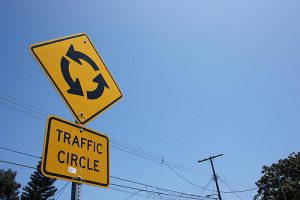 Nobody likes to be pulled over by a police officer. Most of us have experienced this heart pounding moment and we all feel the stress. It may be even more stressful when you experience the traffic stop in a large metropolitan area like Los Angeles, California.
Nobody likes to be pulled over by a police officer. Most of us have experienced this heart pounding moment and we all feel the stress. It may be even more stressful when you experience the traffic stop in a large metropolitan area like Los Angeles, California.
Getting a Ticket in the Los Angeles Metro Area
There are a lot of cars in LA. The city has a well earned reputation for having traffic jams and really long commutes. Californians love their cars.
- Unlike some of the big east coast cities, like New York and Boston, Los Angeles does not have a big and well known public transportation system, hence the traffic.
- All of that driving naturally leads to traffic tickets. If you are unlucky enough to be pulled over in the LA Metro area (or really anywhere) the first thing to remember is to stay calm. It’s tempting to lash out at the officer or act the fool but that is guaranteed to make the situation even worse.
- Cooperate with the officer by making sure you have your driver’s license, vehicle registration and insurance cards handy. If the officer asks you to step out of you car, just do it.
There is also no truth to the idea that signing the ticket is an admission of guilt. That is not the case. Signing the ticket simply constitutes a promise to appear in court on the date on the “Notice to Appear”. Refusing to sign the ticket will result in your immediate arrest which is a bummer. Just sign it so you can continue on your way.
Common Traffic Tickets
There are a number of infractions that a driver can be charged with in a traffic stop. The most common ones are:
- Speeding -This is obviously, going faster than the posted speed limit. This is the most common citation that drivers get all over the country.
- Stop Sign Violation – This one is so common in California that there is even a particular type of situation called the “California Roll”. These charges in California are violations of section 22450(a).
- Failure to Obey a Traffic Control Device – These can be similar to the stop sign violation if the device you are accused of failing to obey is a stop light. These tickets are charged as violations of section 22101(d). There are other traffic control devices around that would fall under this section so not all are red light situations.
Common Areas to Get Tickets
There are a lot of cars in Los Angeles and as a consequence there are a lot of roads in the area as well. Some of these roads are really well known like Hollywood Boulevard and Rodeo Drive. The likelihood of getting a ticket for running a stop sign or light is more likely on certain thoroughfares in the metro area.
The most common ones are La Brea Avenue, Olive Street, Figueroa Street, plus a couple of the big freeways in the city.
Resources for Handling a Ticket
There are really just 3 ways to handle a traffic ticket – admit guilt and pay the fine, hire an attorney to help you defend yourself, or defend yourself in court. It really is that simple. The first two options do involve a monetary commitment. The third option will require a lot of hard work on your part.
One of the things you need to know is where the courthouse is located. It is basically, just off of Washington Street between S. Olive Street and Hill Street.
Most people do several things to successfully fight a ticket. First, stay calm just as mentioned above. Second, organize your facts. Make sure that you know what happened, when, where, and how. Third, make a good impression. Dress and act like a professional. Fourth, keep your focus during the trial so that you can take notes and ask appropriate questions of witness. Fifth, if it’s all just too much hiring an attorney is a great option.
[Image: https://www.flickr.com/photos/chiropractic/3704407919/]
Scott Desind
Latest posts by Scott Desind (see all)
- How to Request the County Seat and Fight Your California Traffic Ticket - May 21, 2023
- Don’t Even Touch That Cell Phone - July 13, 2022
- Innocent Until Proven Guilty - March 2, 2020

